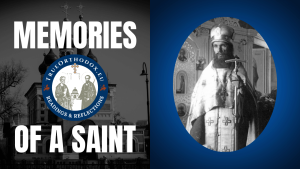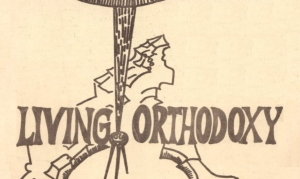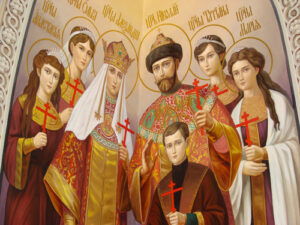A Pastoral Letter by METROPOLITAN ANASTASSY

The following pastoral letter was addressed by Metropolitan Anastassy to the Russian Orthodox people, in reply to the 1945 encyclical of Patriarch Alexei, written to the bishops and clergy of the Russian Church Abroad, advising the latter to “express their repentance before the Church for their sin in severing relations with it, and. by so doing, to re-establish communications with the Mother Church of Russia.” Patriarch Alexei concluded his admonition with threats of excommunication in the event of the refusal by the bishops abroad: to acknowledge his jurisdiction.
THE EXISTENCE OF THE RUSSIAN CHURCH ABROAD was necessitated by the mass evacuation of Russians which took place after the: October revolution of 1917. The Communist government’s cruel oppression of those who were not prepared to accept the Marxist ideology, and particularly their intense persecution of the Church, compelled many bishops and other clergy, as well as part of their congregation, to leave their home land and to seek safety abroad. This movement assumed large-scale proportions, especially after the collapse of the White Democratic Movement.
Once abroad, the bishops, under the leadership of Metropolitan Antony of Kiev, who was second. in authority to the Patriarch, feared. that the numerous Russian refugees might soon disperse amidst foreign surroundings and other faiths, and might lose their Orthodox national aspect. Therefore, bearing in mind the fact that the Church had been, since ancient days, the chief constructive force in Russian national life, they decided at once to organize a religious center.
On November 19th, 1920, Patriarch Tikhon, in conjunction with the Synod, issued a far-sighted edict which outlined the organization of Church administration in the event of any parts of the country becoming cut off from communication with the Russian Supreme Church Council, as was indeed the case at the time, for the -south was severed from Moscow during the Civil War. This edict facilitated the formation of an equivalent organization abroad. The new organization did not look upon itself as an entity separate from the Russian Church, and tried as far as possible to maintain the canonical link: At first, the Patriarch did not appear to regard this step with disfavor, and used the organization to transmit his directions to the dioceses outside Russia. By this means, a Russian bishop for North America was nominated. The Patriarch’s attitude altered only when his entire relationship with the Soviet government underwent a change, and after the famous Genoa Conference he demanded that the Supreme Church Administration Abroad should be dissolved. It was obvious that the direction was issued under pressure, and this was later confirmed by a cleric who had been close to the Patriarch and recently came from Russia. In order not to render the Patriarch’s position even more critical, the Sobor of Bishops Abroad decided to dissolve their organization, and in its place set up a Synod of Bishops Abroad.
This measure brought no criticism from his successor, Metropolitan Peter of Krutitsk, or, during his first years of office, from his locum tenens, Metropolitan Sergei. The rift between Metropolitan Sergei and the organization abroad dates only from the period when he quite consciously and deliberately agreed to cooperate with the godless power, and issued his notorious declaration of June 29th, 1927, which sowed such confusion in the souls of believers both in Russia and in exile.
The bishops abroad were unable to share the views outlined in the declaration, as it was obviously contrary to evangelical and apostolic teaching, differing profoundly from the testament of our Church. They found firm support not only in the unanimously disapproving attitude to the declaration on the part of their congregations, but also from the “Loyalist” bishops in Russia, who categorically refused to support the locum tenens of the Patriarchal See in his perilous course, seeing in this step not only the error of a leader of the Church, but a sin against the Church itself. Sometimes we are told that we who live abroad are ignorant of the conditions existing in Russia, and therefore have no right to pass judgment on those who bear the heavy cross of their task; but the same cannot apply to those estimable religious leaders who have lived in the same dangerous surroundings as Metropolitan Sergei, and have suffered far more persecution than he. They underwent imprisonment, confinement in concentration camps, and banishment to far distant lands, and have lived as men condemned to death: they therefore had the right to demand from him the same sacrifices for the Church as those they had made themselves.
Many eloquent voices were raised in this period. For example, Bishop Damaskin of Glukhov addressed an exhortation to Metropolitan Sergei which achieved a wide circulation not only amongst his numerous followers, but throughout Russia. We quote an extract:
“I, the most humble of the bishops of the Church, moved by sincere love for Christ’s Church and for Your Eminence, have the audacity to beg you, my lord, to lend an ear to the sorrow and lamentations of the faithful which are directed to you from everywhere and which even reach us in the polar regions. Hear the voice of the people, which is surely the voice of God. View soberly the adverse results of the course you have adopted. Shudder at your responsibility for the extinction of religious fire amongst the masses, produced by your declaration. Think of your responsibility at the Last Judgment; revoke your decision and your compromises; annul your declaration, admitting that it is your personal error, surpassing the bounds of your power. Become the herald of Eternal Truth and true evangelical love in the eyes of the whole world. Cast aside human deliberations and calculations, and tread the path of self-dedication in the name of Christ. Do not fear the possibility of worse calamities which await the Church (these are inevitable, and your compromises do but belittle their significance), for the Church will triumph in her procession to a new Calvary, and in her sufferings will bless your name, in the knowledge that the mainspring of contamination of her foundations has been destroyed. But woe unto you, should Your Eminence persist in this course, and openly disregard the voice of the Church, for, pursuing her road to Golgotha, she will disown you, naming you as a participator in her crucifixion.”
What power, what ardent faith, what true wisdom and audacity lie in these fiery words!
The chief fault towards the Church, perpetrated by Metropolitan (later Patriarch) Sergei lies in the fact that he led our Church astray from the path of martyrdom designated by our Holy Founder, and by doing so deprived it of the aureole which surrounded it in the eyes of the whole Christian world.
Of course, persecution must not be considered as a normal condition of the Church. The early Christians did not consider it beneath their dignity to pray for its cessation and to approach secular powers with petitions, “apologies”, for the freedom of their religion; but never did they sacrifice the dignity of the Church in order to achieve their ends, and never debased themselves to a shameful servility before the representatives and leaders of heathen governments. Our descendants will be ashamed when they compare the language of our contemporary religious leaders in there addresses to those in power with that of the early Christians to the Roman emperors and their representatives, that of St. Philip to Ivan the Terrible, or that of St. Mitrofan to Peter the Great, when they defended God’s Truth before secular rulers, and denounced their misuse of the power vested in them from above.
While the present head of the Russian Church follows the example and heritage of his predecessor in his relations with the Soviet government (a point which he had frequently emphasized in the press), and even surpasses him in his desire to adapt himself to the spirit of the times, we do not find it possible for ourselves to enter into canonical communion with him or submit to his jurisdiction. We fully realize the inestimable value of unity in the Church, and would be the last to wish to create discord: but there are moments in Church life when these discords are morally indispensable, and therefore inevitable for us, on the authority of the words of the Founder and Eternal Head: “Think not that I am come to send peace on earth; 1 came not to send peace, but a sword” (Matt. 10:34.) Bearing these holy words in mind, St. Gregory says that there are both “fata! accords and salutary discords”.
The dividing sword of Christ manifests itself with a particular force in days of stress an acute conflict between truth and falsehood, light and darkness, Christ and Antichrist, such as we are now witnessing. According to the apposite observation of a certain theologian, “Love covers all sins except lies and falsehood, especially in relation to the foundations of the Church, which is the pillar and basis of truth.” Each one of us knows that it is easier to follow the wide road, the line of least resistance, than the narrow path. It is not surprising that such roads are always inviting, and that many succumb to the temptations of reaching a compromise by persuading themselves that this is required by the expediences of the time for the good of their country: but nothing good can grow from an evil seed, and therefore we will not follow those who have fallen into temptation, however difficult our position may be.
For a long time now, and “Even unto the present hour we both hunger and thirst; and are naked, and are buffeted, and have no certain dwelling-place: and we labor, working with our own hands: being reviled, we bless; being persecuted, we endure” (I Cor. 4:11, 12), but we never cease to thank God that we have a clear conscience before Him and before men, and that He has willed that we should remain the free part of the Russian Church. It is our duty to maintain cur freedom until we are able to return this priceless pledge to our Mother Church.
Doubtless under pressure of foreign opinion and to meet the awakening in Russia of the national ideals indispensable for the successful conclusion of the war, the Soviet government decided to change its former decidedly censorious and hostile attitude towards the Church, and to allow a certain freedom in the outward expressions of faith to it and to all believers; but the latitude given is too insignificant to redeem all the wrongs done to the Church by the Soviets in past years.
Besides, this liberation appears insecure, as do all insincere actions. Many fear that these relaxations, given so readily, can be as readily withdrawn, as soon as the necessity for them ceases to exist. And it is particularly sad that, in order to obtain a strictly limited freedom, the Church has had to pay such a high price in losing its internal independence. In gratitude for the confidence they now enjoy, the clergy of all ranks have undertaken. to become active collaborators and propagandists of the Soviet government. Having linked their fate to the government, which has never ceased to proclaim its atheism, the clergy have lost their power to preach the truth. To please the government, even the highest and most responsible of the bishops are not ashamed to propagate the manifest untruth that there was never any religious persecution in Russia, and in doing so blasphemously deride the masses of Russian martyrs and sufferers, whom they openly describe as political criminals.
Lies are always abominable. Blessed Augustine said that if the whole world were to hang on one hair which represented falsehood, he would unhesitatingly cut the thread, preferring that the world should perish rather than be submerged in lies. If he who has been called to be a true witness of Christ, deliberately and consciously lies before God and man, he is guilty of the sin against the Holy Spirit, for which Christ sternly rebuked the Pharisees. It is not surprising that the authority of these evil pastors has fallen so low in the eyes of believers that the people are often afraid to confess to them, likening them to salt which has lost its savor.
We cannot read without the most bitter pangs reports by foreign observers on the present-day religious situation in our country; the more so because, in spite of their ironical tone, they do not seek to belittle the authority of our Church, but simply state the facts of its dependence and that of its head on the Communist Party government. It is not without significance that the words “Soviet Church” and “Soviet Patriarch” have become commonplace in the Russian language. The dependence of the present Patriarch on the Soviet government is so obvious and so clear to all, that from the outset it undermines and impairs the canonical validity of the excommunications which he threatens to impose on uncompromising bishops and clergy, since, under existing conditions in Russia, they cannot represent the free expression of the Church authorities, any more than did those of Patriarch Tikhon or Metropolitan Sergei. Nor is it without significance that the Russian bishops in North America, at their conference in Chicago, declared these excommunications null and void.
Besides, such punishments would be illegal, because they would necessarily be imposed on us without a hearing or personal explanations from each of us, and without exercise of other canonical guarantees of justice, which are prescribed by the Church regulations for judgment on bishops and clergy (Apost. 74, Carth. 28, Cyr. Al. 1, etc.). Even if the verdicts passed on uncompromising bishops and clergy were to receive the approval of other heads of autocephalous Churches, that would not give them legal standing, for according to the canons of the Church, each Church possesses only the right to try its own bishops and clergy, and has no right to interfere with the internal affairs of other Churches. Only a freely and legally-convened All-Russian Church Assembly, entirely independent in its decisions, with the participation, if possible, of all bishops abroad, and particularly of those imprisoned in Russia, would be the rightful body to decide the issue between the bishops abroad and the present head of the Russian Church; and to such a body we are prepared to account for all our deeds, at any given time of our exile. But, of course, such an assembly is impossible under present conditions.
Being himself uncertain of the validity of his church excommunications, Patriarch Alexei is obviously endeavoring to transfer the issue from the canonical to the political plane, and attempts (chiefly for the benefit of the Soviet government) to accuse the Synod of Bishops Abroad of, allegedly, bestowing their “Church benediction on a historical enemy of Russia— Germany — in her efforts to ruin and conquer Russia.” As proof, he refers to an address of thanks to Adolf Hitler, presented by the Synod of Bishops in 1938, but he intentionally does not disclose the reason why such an address was presented.
Soon after his rise to power, Hitler learned that the Russians in Berlin had no church of their own, as the church they had erected was sequestered from the congregation for unpaid debts. He at once gave orders for the allotment of funds for the erection of a new Orthodox church on an excellent site in the German capital. It must be stated that Hitler took this step without any request from the Russian congregation, and that the gift involved no possible obligation.
The Synod of Bishops, as all Russians abroad, could not but appreciate this open-handed gesture, which coincided with a time when in Russia churches and monasteries were being mercilessly closed, demolished or turned to uses for which they were not intended (such as clubs, cinemas, anti-religious museums, food stores, etc.), and other holy places were being desecrated. This fact was referred to in the address, but there was no “benediction … to ruin and conquer Russia.” This, of course, was never given by the Synod. The Patriarch’s assertion that “leaders of Church life amongst the Russian emigration held public prayers for Hitler’s victories is equally untrue. The Synod of Bishops has never prescribed such prayers, and, in fact, forbade them, demanding that Russians should only pray for the salvation of Russia.
We must not ignore the fact that, wearied by their long sufferings and driven almost to desperation by the terror existing in Russia, some refugees and some Russians in their own land pinned their faith on Hitler, who declared irreconcilable strife against communism. (It is well known that this is an explanation of the mass surrender of Russian armies at the beginning of the war.) But when it became obvious that Hitler’s real aim was to conquer the Ukraine, the Crimea, the Russian and other rich regions of Russia, that he not only despised the Russian people, but intended their destruction, that by his orders our prisoners of war were starved to death, that in its retreats the German army burned and annihilated all Russian towns and villages in its wake, slaughtered or enslaved their populations, condemned to death hundreds of thousands of Jews, including women and children, forcing them to prepare their own graves—then the hearts of all reasonable persons turned against him, except those who “desired to be misled.”
Then it became clear to all that not only was Hitler not ushering in a new era of social and economic well-being, as he proclaimed in his speeches, but was preparing his own perdition as well as that of his people and all those who linked their fate with his —a perdition which we have now witnessed. Founded on an irreligious and amoral basis, his entire plan crumbled, and buried him and his closest collaborators under its ruins. This terrible lesson was necessary for the whole contemporary world, so that all should see that he who builds life without God, builds on sand, and is doomed from the outset.
Out of the storm and tempest of the days through which we have lived and in which some of us are still living, we seem to hear a heavenly voice crying out to the whole world: “Behold, I have refined thee, but not with silver; I have chosen thee in the furnace of affliction. Oh, that thou hadst hearkened to My commandments: then had thy peace been as a river, and thy righteousness as the waves of the sea” (Isaiah 58:10, 18). In these words we must seek the key to the comprehension of our own country’s destiny. Though torn from direct contact with the soil of their native Russia, her exiled sons never betrayed her, and never forgot the grievous calamities which had overtaken her. Least of all, of course, could the Orthodox bishops and clergy remain indifferent to Russia’s fate. That was the reason why they went into voluntary exile, to remain true to the holy heritage of our history, in the building of which our Church played so great a part.
In their twenty-five years spent by the waters of Babylon, they ever directed their gaze towards their native Sion, and lived by the same thoughts, feelings and hopes as their long-suffering flock. They ever believed in the great historical vocation and the indestructible moral power of Russia, and maintained consciousness of this destiny amongst their exiled compatriots, exhausted and despairing beneath the burden of their sorrows and afflictions. They attentively observed the trends of the times, trying to discern in them an approaching resurrection of Russia.
It may be that this moment is approaching now.
Resplendent in the glory of her victories, in which the Russian military genius and the eternal courage of our soldiers has shown. itself so brilliantly, gathering into her hands the realm of which she was deprived by historical events, Russia could indeed become a blessed country, the happiest in the world, if a new way of life could but be introduced, founded on the keystone of. the Orthodox Faith of our fathers, and on the principles of complete freedom, love, fraternity and truth, adorned by the high achievements of technical, economic and social culture.
We pray to the Almighty unceasingly, now that Russia is at a new turning-point in her history.
Our prayer is as fervent as our love for our country. It is all expressed in the following words: “O God, enlighten, instruct, pacify and unite us all by Thy mercy, and appear also to them that do not seek for Thee, that they may turn to Thee with all their hearts, and may. profess. Thy. greatness, strength and glory, which from of old Thou hast manifested in the destinies of our great Motherland.”
Reprinted from Russia, Vol. III, No: 32, Jan. 15, 1946.
Source: Orthodox Life Magazine, 1977 Vol 6, Jordanville, New York, USA







